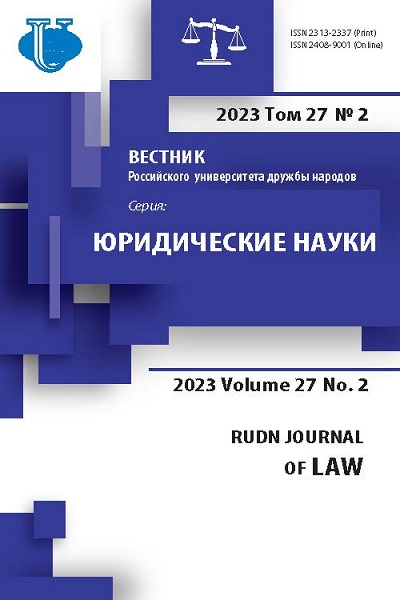Justification of the right to subsistence in contemporary Western philosophy: challenges and solutions
- Authors: Shaveko N.A.1
-
Affiliations:
- Institute of philosophy and law, Ural Branch of the Russian Academy of Sciences
- Issue: Vol 27, No 2 (2023)
- Pages: 309-320
- Section: STATE AND LAW IN CONTEMPORARY WORLD
- URL: https://journals.rudn.ru/law/article/view/35026
- DOI: https://doi.org/10.22363/2313-2337-2023-27-2-309-320
- EDN: https://elibrary.ru/SGNBFC
- ID: 35026
Cite item
Full Text
Abstract
The article discusses the views of modern Western philosophers on the isuue of socio-economic human rights, including the right to subsistence. The purpose of the work is to answer the question of whether the right to a decent life is morally justified. The work was carried out within the framework of the analytical approach and its inherent methodology. The author identifies several types of arguments expressed in Western literature against the right to a worthy existence. They are 1) actual impossibility of guaranteeing these rights; 2) denial of non-contractual positive obligations that could correspond to this right; 3) problematization of the imperfect nature of positive obligations corresponding to this law. It is shown that these objections in themselves are not sufficient to reject the right to a worthy existence, but they show that at the abstract level this right cannot be justified only in a “negative” sense, that is, as the right to which only the negative duties of others correspond. The author proposes to consider options for solving the problems that gave rise to discussions concerning the right to a dignified existence, outside of human rights discourse. Thus, the moral basis for the fight against poverty and other features of an “unworthy” existence can be formulated by applying to the public sphere (by analogy) the categories of civil law - condiction, tort and contract, as well as taking into account the classical conditions for the onset of legal liability. Moreover, the moral justification for securing some “decent” level of existence is achieved by referring to the general principles of fair distribution of material wealth (regardless of what is considered a “decent existence”). One of these principles is the Rawlsian principle of difference, which does not depend either on the idea of a person as a “moral agent” who requires some kind of minimum (“worthy”) level of well-being, or on understanding of the human rights nature.
About the authors
Nikolai A. Shaveko
Institute of philosophy and law, Ural Branch of the Russian Academy of Sciences
Author for correspondence.
Email: Nickolai_91@inbox.ru
ORCID iD: 0000-0002-5481-7425
SPIN-code: 3004-0891
ResearcherId: K-4637-2018
Candidate of legal sciences, researcher
16 S. Kovalevskaya str., Yekaterinburd, 620108, Russian FederationReferences
- Ashford, E. (2007) The duties imposed by the human right to basic necessities. In: Pogge, T. (ed.) Freedom from poverty as a human right: who owes what to the very poor? New York, Oxford University Press, pp. 183-218.
- Beitz, Ch.R. (2009) The idea of human rights. New York, Oxford University Press.
- Campbell, T. (2007) Poverty as a violation of human rights. In: Pogge, T. (ed.) Freedom from poverty as a human right: who owes what to the very poor? New York, Oxford University Press, pp. 55-74.
- Caney, S. (2007) Global poverty and human rights. In: Pogge, T. (ed.) Freedom from poverty as a human right: who owes what to the very poor? New York, Oxford University Press, pp. 275-302.
- Gilabert, P. (2009) The feasibility of basic socioeconomic human rights: a conceptual exploration. The Philosophical Quarterly. (59), 659-681.
- Griffin, J. (2008) On human rights. New York, Oxford University Press.
- Hessen, S.I. (1999) Selected works. Moscow, ROSSPEN Publ. (in Russian).
- Lichtenberg, J. (2009) Are there any basic rights? In: Beitz, Ch.R. & Goodin, R.E. (eds.) Global basic rights. New York, Oxford University Press, pp. 71-91.
- Nickel, J.W. (2005) Poverty and rights. The Philosophical Quarterly. (55), 385-402.
- Novgorodtsev, P.I. (2010) Selected works. Moscow, ROSSPEN Publ. (in Russian).
- O’Neill, О. (1996) Towards justice and virtue: a constructive account of practical reasoning. Cambridge, Cambridge University Press.
- O’Neill, О. (2000) Bounds of justice. Cambridge, Cambridge University Press.
- Payne, M. (2008) Henry Shue on basic rights. Essays in Philosophy. 9 (2), 220-227.
- Pogge, T. (2002) World poverty and human rights: cosmopolitan responsibilities and reforms. Cambridge, Polity Press.
- Pogge, T. (2005) World poverty and human rights. Ethics & International Affairs. 19 (1), 1-7.
- Rawls, J. (2010) A theory of justice. Moscow, LKI Publ. (in Russian)
- Reus-Smit, C. (2009) On rights and institutions. In: Beitz, Ch.R. & Goodin, R.E. (eds.) Global basic rights. New York, Oxford University Press, pp. 25-48.
- Sen, A. (1982) Poverty and famines: an essay on entitlement and deprivation. New York, Oxford University Press.
- Shue, H. (1980) Basic rights: subsistence, affluence and U.S. foreign policy. Princeton, Princeton University Press.
- Tasioulas, J. (2007) The moral reality of human rights. In: Pogge, T. (ed.) Freedom from poverty as a human right: who owes what to the very poor? New York, Oxford University Press, pp. 75-102.
- Tomalty, J. (2011) On subsistence and human rights. PhD Thesis. University of St. Andrews.
Supplementary files















